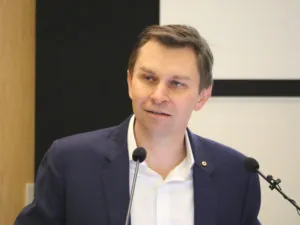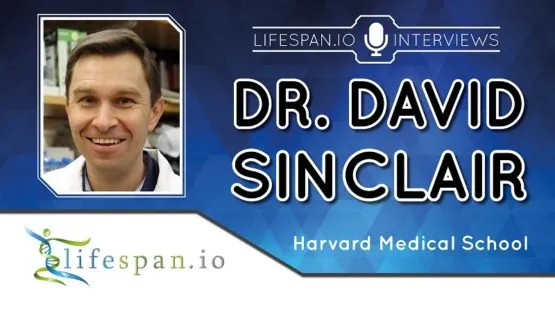Dr. David Sinclair, a Professor of Genetics at Harvard Medical School, is one of the most well-known researchers in the field of rejuvenation, and his lab is the beneficiary of a successful Lifespan.io campaign.
Today, Dr. Sinclair is releasing his book on Amazon, “Lifespan: Why We Age and Why We Don’t Have To”, and on Wednesday, September 18, we hosted a special webinar with Dr. Sinclair as well.
David has recently appeared on shows such as Joe Rogan, not once but twice, the David Pakman show, and Tom Bilyeu. At International Perspectives in Geroscience, a conference hosted at Weizmann Institute of Science (Israel) on September 4-5, we had the opportunity to interview Dr. Sinclair about his work and his thoughts on the current state of research.
Back in February, you and a group of 16 researchers in the aging field went to the Academy for Health and Lifespan Research with the aim of promoting aging research, fostering the sharing of knowledge between scientists, and helping to guide governments and other key players in the industry. Could you please tell us a little more about the Academy and its current activity?
The Academy is a founding group of scientists who seek to understand the fundamental causes of aging and how to combat it. We have come together to build a society, a group of leaders around the world who will act as one voice to help shape not just the research, but public policy, future economic effects of the research, and medicines that are going to come from this field.
Do you think that aging is a disease or a syndrome or not? What’s your opinion on that?
Well, first of all, there’s no correct answer. There is no law that says something’s a disease and something is not. Currently, the medical definition of a disease is something that causes a dysfunction or disability that happens to less than half of the population. Of course, aging happens to most of the population now, but I think that having a cut-off at 50% is arbitrary. Something that causes decline in functionality and eventual death should be worked on just as vigorously as something that only affects a minority of people.
Do you think that recognizing aging as a disease, in, say, the International Classification of Diseases makes sense in order to accelerate the development of new therapies addressing the root mechanisms of aging?
The World Health Organization’s new definition of aging as a condition is helpful, but the real change will come when a leading country says that aging is a disease that can have a medicine approved for treatment. Right now, because aging is not a condition that’s agreed upon by any regulator, drugs that may slow or reverse aging, and perhaps extend lifespan, healthy lifespan, for many years, doctors are very hesitant to prescribe those medicines. They follow the rule book. Metformin is a good example of a drug that is relatively safe and cheap and could potentially have a big benefit. But, because aging is not a disease, doctors rarely provide it to their patients until they actually become diabetic.
Basically, that means that the position of the government has to change and then once the government declares sort of a war on aging, then there could be some regulation changes, and then it may come to the point when doctors will be mentally ready to prescribe these drugs, right?
That’s right. Also, if aging is a prescriptable condition, then investment in aging-related drugs or longevity medicines will increase by orders of magnitude. The problem today is because aging isn’t a prescriptable condition, drugs have to be developed for other diseases first, with the hope that then they’ll be used more broadly.
Currently, medicine treats the symptoms, not the causes, of age-related diseases. Do you think that we might soon reach the point where therapies will be taken in a preventive manner to delay the onset of age-related diseases? What do you think might be the turning point for things to change? Basically, prevention is always a problem, even though it’s one of the most effective strategies, but we seem to never get there.
Well, there’s a subset of the population, particularly in the US, but increasingly around the world, who are using the internet to educate themselves and are trying to take action before they become sick. Sometimes with medical supervision, sometimes not. It’s a grassroots movement right now; for it to become mainstream, the regulations would have to change so that doctors can feel comfortable prescribing medicines to prevent diseases. But, if we don’t change, then we will continue to practice whack-a-mole medicine and only treat one disease at a time after it’s already developed.
 You travel the world a lot. Is there a country that you think is more forward-thinking in how aging is viewed and might take the first move to define aging as a directly treatable condition?
You travel the world a lot. Is there a country that you think is more forward-thinking in how aging is viewed and might take the first move to define aging as a directly treatable condition?
There are a few; the leading contenders right now are Australia, Singapore, and then the US and UK are also talking about it. The first country that does take this first bold step will reap the rewards of that with more investment and, of course, an increasingly productive and healthy population.
You name the countries that seem to have the highest life expectancy, actually. Do you think that it’s related to the understanding that the problem of population aging is becoming severe enough?
That’s exactly right. The countries that have a problem with the healthcare of the elderly have to do something because of the increased amount of elderly will only continue to raise the percent of GDP those countries spend; right now the US already spends 17%. They’re not getting any younger, and their life expectancy isn’t changing. So, for the US to really make progress, they need a new approach to medicine.
Let’s talk a little bit more about your work. You are very well known for your work with NAD+ and its precursors; we’re often asked whether NR or NMN is better. However, the data seems to suggest that different precursors are more or less efficient in a tissue- or organ-dependent manner. Would it be fair to say that rather than asking which is better, we should instead consider these differences and that both may have their place?
They’re very similar molecules, and both have been shown to provide a variety of health benefits in mice. That doesn’t mean either of them will work to slow aging in humans, and that’s why placebo-controlled clinical trials are required to know if one of them, or both of them, will work in certain conditions.
There has been a great deal of debate over the ability of NMN to pass through the plasma membrane to reach the interior of the cell. However, you and your team recently showed that under certain conditions, NMN can indeed enter the cell via a previously undocumented transporter without the need to change back to NR. Have there been any further developments with this? In particular, what does this mean for the efficiency of NMN, given its close proximity to NAD+ in the salvage pathway?
The NMN transporter was recently published by Shin Imai’s group; I wrote a commentary about it. I’m aware of work that’s not yet published by a few different labs, looking at how these molecules travel through the body of a mouse. The conclusion is that some tissues have transporters, some don’t. It can even vary depending on where in the gut you’re talking about. I think, in the end, what’s going to happen, like most areas of science, is that everybody’s right; it just depends on what you’re talking about.
There is a number of human trials in progress for NMN, including one at Brigham and Women’s Hospital. Can you tell us anything about that, and when might we expect to see some results?
Those studies began over a year ago, and they are currently Phase 1 safety studies in healthy volunteers. Next year, the plan is to test the pharmaceutical product in a disease area, most likely a rare disease, but also in the elderly to see if we can recapitulate some of the results we’ve seen in mice, such as increased blood flow and endurance.
 Another area that you are involved in is partial cellular reprogramming to reverse age-related epigenetic alterations in cells and tissues. This is a topic that we have written about in the last year or two. Given the success of Belmonte and his team, and the enthusiasm for the approach in general, it really seems to have great potential. Can you please tell us a little bit about this approach and the approach that you are taking and how you’re progressing so far?
Another area that you are involved in is partial cellular reprogramming to reverse age-related epigenetic alterations in cells and tissues. This is a topic that we have written about in the last year or two. Given the success of Belmonte and his team, and the enthusiasm for the approach in general, it really seems to have great potential. Can you please tell us a little bit about this approach and the approach that you are taking and how you’re progressing so far?
For 20 years, we’ve been working on epigenetic changes as a cause of aging, starting with work in yeast and now in mammals. We’ve developed viral vectors and combinations of reprogramming factors that appear to be much safer than the Belmonte work, and we’ve used them to reprogram the eye to restore vision in mice with glaucoma and in very old mice.
Some people argue that epigenetic alterations are similar to the hands of a clock and they only reflect aging, making them not an underlying cause but rather a consequence; do you consider them a cause or a consequence, and when partial programming is initiated, should it be considered to be actual rejuvenation?
Currently, it is believed that the clock is just an indicator of age and not part of the actual aging process, but our recent work that we deposited on bioRxiv strongly suggests that the process of reversing the clock doesn’t just change the apparent age of the body, it actually reverses aging itself by restoring the function of the old cells to behave as though they’re young again. Therefore, the clock may not just be telling time; it may actually be controlling time.
That sounds fascinating. So, it’s actual rejuvenation, right?
It’s early days, but this appears to be as close to rewinding the clock and rejuvenating at least parts of the body than anything that we’ve worked on before.
Back in 2016, when Belmonte and his colleagues demonstrated that partial cellular reprogramming in mice was possible, he estimated that such approaches might reach the public in the next decade. Do you think that we are on track for this to happen?
We’re now more than on track. We’re actually ahead of schedule. We found an apparently safe way to reprogram tissues, complex tissues, and there are at least two companies now expecting to start clinical trials within the next two years in humans.
Can you tell us a little bit more about that, or is that secret for a while?
One of the companies is called Iduna, and I formed this company with Steve Horvath, Belmonte, and Manuel Serrano in Spain. We have the funding to start a clinical trial next year.
Partial reprogramming is altering ourselves at the cellular level; how do you think the general public might react to such an idea, in your view? Is this going to be a real hurdle to getting people on board with using these treatments?
I found that everyone who hears these results of the Belmonte lab and of my lab is extremely excited because it’s a very simple but powerful concept of rewinding the clock, and I don’t know of anybody who has said that we shouldn’t go faster in trying to develop this technology.
 In general, what’s your usual way of overcoming the initial skepticism regarding the idea of healthy life extension? Because there is this problem with “life extension”, that people sometimes react weirdly to it.
In general, what’s your usual way of overcoming the initial skepticism regarding the idea of healthy life extension? Because there is this problem with “life extension”, that people sometimes react weirdly to it.
I’ve faced that my whole career since I started; there’s always going to be a group of individuals who don’t believe that humans are capable of certain things. It was the same with flying back in the early 20th century. I think we know enough now about how aging works and how to slow it and possibly reverse it that it’s going to be possible in our lifetimes to have a big impact on our healthspan and probably lifespan. Anybody who thinks that it’s not doesn’t know how fast science is moving.
What’s your usual way to deal with skepticism; do you have some favorite arguments?
Mostly, I just go back to the lab and do better research and let the data speak for itself. There are a lot of people who won’t be convinced until they see the actual experiments redone many times. What I’ve done in the past two years is I’ve put all my ideas and the advances in the field into a book, so I’m hoping that this book will convince the skeptics or at least make them think hard about what’s possible with their lives, what they can do now, and what soon should become possible.
Wonderful. Actually, my next question was about this book; could you please tell us a little bit more about it and what the readers should look forward to.
“Lifespan” takes the reader on a journey through history, looking at the endeavor of humans to try to live longer and using that historical perspective to look at today’s situation and project into the future. The book also takes readers on a journey through the very cutting edge of aging research and things that the reader can do right now to take advantage of these new discoveries in their daily lives with changes in their daily activity, what they eat, when they eat, but also medicines that are currently available on the market that may extend lifespan. The last chapter is about where we are headed, what are the medicines that are in development, and then when these drugs become available, what does the world look like? Is it a better place or a worse place, and how will our lives change?
Wow, that sounds like a book that I would really like to read. You look pretty amazing for being 50 years old. I’m 40, and I think you look better than me. Are you doing something to support your health, to feel better, to be more productive and to age slowly?
I’m doing an experiment right now in my body. My father, my wife, and my dogs. It’s voluntary, of course; my brother recently complained that he was being treated as the negative control in the experiment. I believed in the research and known the risks to be low, so, starting with resveratrol in 2003, I started taking that and I’m still taking it, and I’ve added to that NMN and some metformin as well. I try not to eat too much. I should exercise more. What I do, and what I’ve learned works for me, and for members of my family, is also written down in detail in my book. So, if people would like to know it, they can read it.
Finally, is there a question that no one ever asks you and that you would like us to ask?
Am I afraid of dying?
Are you?
No.
Why not?
I’ve been in situations where I thought I could die, planes that have lost their control, that kind of thing. I don’t get nervous; I’m not worried about that. The reason that I’m doing what I’m doing is I’d like to leave the world a better place than I found it. I’m also very curious, I’d like to see what we can discover and what the future holds for all of humanity, not just for longevity, but the future of the planet. See if we can point humanity in the right direction and away from the bad scenarios that we seem to be on right now.
We would like to thank Dr. Sinclair for taking the time to make this interview with us and for answering our questions. If you would like to learn more about his work, you may be interested in watching the special webinar we did with Dr. Sinclair in September 2019 which you can see on our YouTube channel here.





